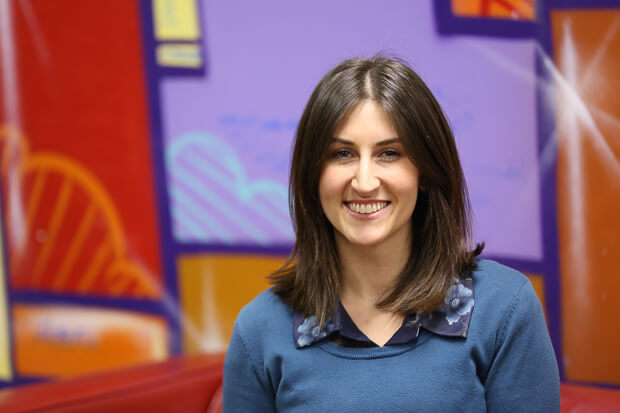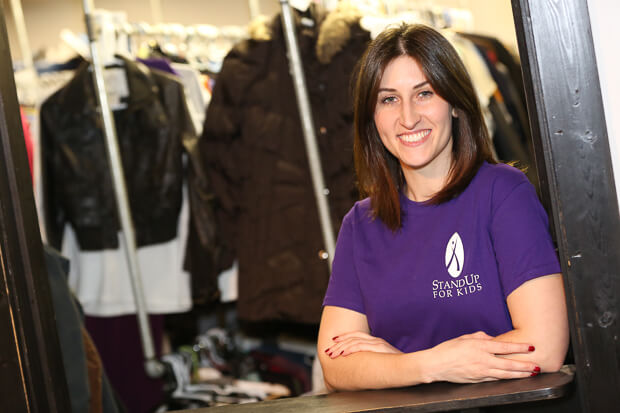Kids forced to live in any level of homelessness are regularly targeted by gangs, human traffickers and pornographers, and they endure inconceivable peril in their struggle for survival. StandUp For Kids works to end the cycle of youth homelessness through direct outreach and mentoring programs, providing crucial support and teaching valuable life skills to help turn them toward a hopeful future. Jennifer Greenlee, the StandUp For Kids Atlanta chapter’s Director of Alternative Outreach and Mentoring, spoke with us about her mission and methods for nurturing them. Welcome, Jennifer!

When did you begin working with StandUp For Kids?
While pursuing my Master of Social Work at Georgia State University, a field requirement called for partnership with a nonprofit organization. StandUp For Kids submitted a proposal to the department, and after interviewing with two other agencies, we chose SUFK. The project lasted one semester, and shortly after I graduated, I gravitated to StandUp For Kids to explore possible volunteer opportunities, which shockingly led to a job offer. I’ve now been a full-time employee with SUFK for a little over a year, in a grant-funded position, and I work almost solely with volunteers. I feel so very lucky to be able to serve this way, to harness my passion for this community and to have the constant support of Executive Director Kelly Fields, who made this all possible.
Explain to us how kids find themselves in the program.
These are kids without parents or guardians, without a stable home environment or even appropriate housing. They lack a foundation of trust, care and life skills, and they might already have their own kids. These kids might sleep in a room with five others or stay at a hotel … their parents may have been incarcerated or passed away, or just thrown them out due to teen pregnancy or sexual orientation.
SUFK Atlanta chapter has three programs: Street Outreach, the Youth Outreach Center and a school-based mentoring program, for which I serve as director. The mentoring program focuses on students who, despite their circumstances, fight to keep themselves in school and need support to do that. These kids are identified by partnership between school social workers and a county homeless liaison upholding The McKinney-Vento Homeless Assistance Act, which ensures homeless students still have access to equal educational opportunities and services. The lack of awareness surrounding this act is unfortunate and disconcerting, so I urge everyone to be acquainted with it.

What services does SUFK provide?
Students are matched with a caring volunteer mentor who meets with them bi-weekly during their scheduled school lunch period. It is a constant joy to see just how excited the students are that someone, who isn’t paid or required to be there, takes time for them. Volunteers need not be well-versed in any of our focus areas; simply talking and showing an interest makes a difference.
For kids who lack basic necessities, succeeding in school is about more than just academics. To aid in alleviating the financial strain of meeting their basic needs, we also have a modest financial incentive — an educational stipend (Walmart gift card) awarded on the basis of academic achievements. Students must maintain a C average or better in their classes, as well as maintain good attendance.

Tell us about your typical day, or week, at work.
No such thing as a typical day — I shift between being on-site at schools, doing outreach and scheduling much-needed office time. Our center downtown gives homeless and street youth access to a hot meal, laundry, a nurse and volunteers. Our street teams make rounds at night twice a week, forming relationships with kids on the street in downtown Atlanta and connecting them to resources. Some days, I might be at a school all day coordinating meetings and dropping off supplies/donations, then drive back to the office to catch up before heading out to the street doing outreach. Slower days are spent at the office researching grants, partnership opportunities and ways to enhance the community involvement. My kids and my volunteers are of the utmost importance … without the volunteers and community support we would not be able to continue our programs.
How do you keep your own emotions in check while you work? Is it tough NOT to become attached to individual kids?
This is a difficult subject, and will continue to be, as the nature of my work requires finding a balance that allows compassion while maintaining boundaries. I have to take steps to regulate how much I take home with me. Yes, it’s tough not to become attached to individual kids … every kid … every day! Ultimately, I use the positive, supportive and experienced professionals around me for guidance. It isn’t about suppressing emotions necessarily, but about using them effectively. Also, I find hiking or any type of exploring always aids me in processing.

Tell us how to help. What are your greatest needs right now?
We’re a grassroots organization, so there are many opportunities, for both individuals and groups, to volunteer in one-time activity or a weekly/monthly commitment. We ask for “things” so very easily — we need underwear, clothing, groups to put together hygiene and food packs — but it’s often difficult to ask for monetary support. A recurring monthly donation or youth sponsorship can be a meaningful way to get involved if unable to devote time. We also currently need assistance in grant-writing, fundraising, marketing and administrative tasks (volunteer from home!). It’s amazing what one person can do, whether it’s making a connection to a local restaurant to host a fundraising night or starting up a corporate volunteer group activity.
Do volunteers undergo specific training in order to serve?
Yes! Every volunteer must complete a one-time, one-day volunteer training and a background check prior to working with our kids. However, if your volunteer opportunity includes providing food, sorting donations, etc., then training is not required. Training is only a prerequisite for working directly with youth.
What do you wish more people understood about homeless/at-risk kids?
I wish they knew the prevalence. That their kids might sit next to some of mine in class, but would never know. That every day they probably walk past them on the streets or in shopping malls. Throughout North and South Fulton, the streets of Atlanta … it’s an invisible population. I also wish people understood their own capability and capacity to make a difference in their community and in the lives of these youth — everyone has something to offer to help us prevent youth homelessness continuing into adulthood.

Who are your biggest mentors, and what advice have they given you?
My family continues to surprise me with their support. Some of my biggest mentors have been the strong women I’ve encountered throughout my life. I rode and showed horses in events growing up and had an older friend who took me under her wing. From her, to a professor who took me out of the country for the first time on a study tour, and my current boss, I’ve learned similar unifying notions — number one, the importance of relationships, and number two, never settle, for failure only happens when you stop trying.
This can be a stressful job, so how do you unwind? What do you do to relax or treat yourself? Any special splurges?
I love to eat. And I get really excited for a movie paired with that food somehow! Treating myself usually involves sleeping in very late and then rushing to get outside to enjoy the day. I really love walking around, trying new food, biking and finding new beautiful places in and around the city.
Tell us some of your favorite local restaurants.
I absolutely cannot get enough soup right now, specifically Asian soups and stews. To feed this craving, I go to Buford Highway often. Gato in Candler Park is also a big favorite. In other food-related news: I recently tried Kimball House and am overboard in love. I adore Victory’s sandwiches and pretty much anything at the Sweet Auburn Curb Market.

What’s on your personal reading list right now?
Haruki Murakami’s Blind Willow, Sleeping Woman, Mark Twain and a sign language dictionary (trying to reteach myself the basics).
What are three things you just cannot live without — other than faith, family and friends?
- Cuddles with my fat, black cat
- Copious amounts of coffee and tea, and my wonderful almost 2-year old nephew.
- Lastly, traveling and exploring. This which I need to focus on doing much, much more of this new year! Time to plan …
Jennifer, we’re in awe… you’re devotion and tenacity changes lives every day and our entire community benefits. Learn more about StandUp For Kids at www.standupforkids.org, and check out their volunteer and donation opportunities. Follow SUFK on Facebook for regular updates on projects and events.



















